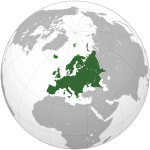Íslándì
Íslándì Iceland Ísland
| |
|---|---|
Orin ìyìn: Lofsöngur | |
![Ibùdó ilẹ̀ Íslándì (dark green) on the European continent (dark grey) — [Legend]](http://upload.wikimedia.org/wikipedia/commons/thumb/6/66/Europe-Iceland.svg/250px-Europe-Iceland.svg.png) Ibùdó ilẹ̀ Íslándì (dark green) on the European continent (dark grey) — [Legend] | |
| Olùìlú àti ìlú tótóbijùlọ | Reykjavík |
| Àwọn èdè ìṣẹ́ọba | Icelandic (de facto) |
| Àwọn ẹ̀yà ènìyàn | 93% Icelandic, 7.0% other (see demographics) |
| Orúkọ aráàlú | Icelander, Icelandic |
| Ìjọba | Unitary parliamentary republic |
| Guðni Th. Jóhannesson | |
| Bjarni Benediktsson | |
| Birgir Ármannsson | |
| Establishment — Independence | |
| 930 | |
| 1262 | |
• Norway enters Kalmar Union[a] | 1388 |
| 14 January 1814 | |
• Constitution granted, limited home rule | 5 January 1874 |
• Home rule expanded | 1 February 1904 |
| 1 December 1918 | |
| 9 April 1940 | |
• Republic of Iceland, personal union ends | 17 June 1944 |
| Ìtóbi | |
• Total | 103,001 km2 (39,769 sq mi) (107th) |
• Omi (%) | 2.7 |
| Alábùgbé | |
• 2024 census | 399,189 |
• Ìdìmọ́ra | 387/km2 (1,002.3/sq mi) (232nd) |
| GDP (PPP) | 2023 estimate |
• Total | $27.078 billion (151st) |
• Per capita | $69,833[1] (13th) |
| GDP (nominal) | 2023 estimate |
• Total | $30.570 billion[1] (13th) |
• Per capita | $78,836[1] (8th) |
| Gini (2018) | 23.7 low |
| HDI (2022) | 0.959 very high · 3rd |
| Owóníná | Icelandic króna (ISK) |
| Ibi àkókò | UTC+0 (GMT) |
• Ìgbà oru (DST) | not observed |
| Ojúọ̀nà ọkọ́ | right |
| Àmì tẹlifóònù | 354 |
| Internet TLD | .is |
a. ^ Danish monarchy reached Iceland in 1380 with the reign of Olav IV in Norway. b. ^ Iceland, the Faeroes and Greenland were formally Norwegian possessions until 1814 despite 400 years of Danish monarchy beforehand. | |
Íslándì[note 1] (Íslándíkì: [Ísland] error: {{lang}}: text has italic markup (help); IPA: [ˈislant]) je is orile-ede erekusu Europe ni to budo si Okun Ariwa Atlantiki[6] lori Ebe Arin-Atlantiki. O ni olugbe bi 399,000 ati apapo iye aala 103,000 km2 (39,769 sq mi).[7] Oluilu re ati ilu totobijulo re ni Reykjavík, pelu ayika re to ni ida meji-inu meta olugbe orile-ede na. Iceland je agbese lileru ati loro-ile.
- Íslándì - Ísland
-
Íslándì
-
Reykjavik
-
Skogafoss
-
Godafoss
-
Reynisfjara
-
Akureyri
-
Myvatn
-
Joekulsarlon
-
Skeidararsandur
-
Sveinbjarnargerdi

|
Àyọkà yìí tàbí apá rẹ̀ únfẹ́ àtúnṣe sí. Ẹ le fẹ̀ jù báyìí lọ tàbí kí ẹ ṣàtúnṣe rẹ̀ lọ́nà tí yíò mu kúnrẹ́rẹ́. Ẹ ran Wikipedia lọ́wọ́ láti fẹ̀ẹ́ jù báyìí lọ. |
Itokasi
[àtúnṣe | àtúnṣe àmìọ̀rọ̀]- ↑ The country's official name is Iceland. Although many sources—including the CIA World Factbook,[2] Encyclopedia Britannica,[3] and the United Nations[4]—give "Republic of Iceland" (or "Lýðveldið Ísland" in Icelandic) as the official name, this conventional long name is actually not the official name of the country. The word "republic" is used only descriptively of the country's form of government and is not part of the country's actual name. This has been explained in a letter from the Office of the Prime Minister of Iceland to Ari Páll Kristinsson, Associate Professor at the Árni Magnússon Institute for Icelandic Studies.[5]
Ikiyesi
[àtúnṣe | àtúnṣe àmìọ̀rọ̀]- ↑ 1.0 1.1 1.2 Àṣìṣe ìtọ́kasí: Invalid
<ref>tag; no text was provided for refs namedimf2 - ↑ "Iceland". The World Factbook. CIA. 20 January 2010. Archived from the original on 18 May 2020. Retrieved 17 February 2010.
- ↑ "Iceland". Encyclopedia Britannica. Britannica.com. Retrieved 17 February 2010.
- ↑ "UNGEGN List of Country Names" (PDF). United Nations Group of Experts on Geographical Names. 2009. p. 48. Archived from the original (PDF) on 24 December 2010. Retrieved 17 February 2010. Unknown parameter
|month=ignored (help) - ↑ "Hvert er formlegt heiti landsins okkar?" (in Icelandic). Vísindavefurinn. Retrieved 21 February 2010.
- ↑ "CIA – The World Fact book – Iceland". Government. United States Government. 20 July 2006. Archived from the original on 18 May 2020. Retrieved 6 August 2006.
- ↑ "Statistics Iceland". Government. The National Statistical Institute of Iceland. 14 September 2008. Retrieved 14 September 2008.
Iwe fun kika
[àtúnṣe | àtúnṣe àmìọ̀rọ̀]- Jonsson, Asgeir (2008). Why Iceland? How One of the World's Smallest Countries Became the Meltdown's Biggest Casualty. McGraw-Hill Professional. ISBN 978-0071632843.













